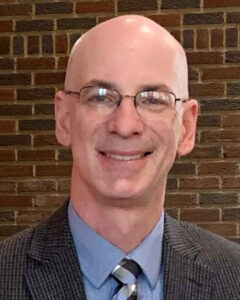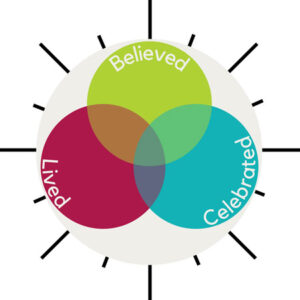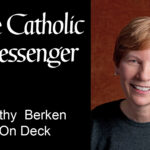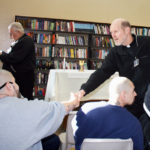By David Pitt
As I was driving past a cemetery years ago, I recall being startled by a glint of light. I was surprised to find 20 or so bikers standing around, motorcycles parked beside them — and they all seemed to be drinking. I was shocked. No, I was scandalized. Surely, they could have found a more respectful place to stop for an afternoon beer. My sense of scandal turned to shame when I saw one solitary beer can sitting on the headstone. These bikers weren’t loitering; they were remembering a fallen friend. No, in their celebration they were re-membering a fallen friend.

Accompanied, no doubt, by stories of their shared past experiences, they weren’t just drinking at the graveside; they were drinking with one with whom they had drunk before. There was something profoundly “liturgical,” deeply “eucharistic” about what I saw: people gathered to enact (not re-enact) memorial, to participate in (not redo) ritual. We, too, gather to re-member and celebrate. We share stories — both in word and in action around the ambo and around the altar — of how God, especially through Jesus Christ, draws us together. Those bikers and their beers help clarify the significance of one of the memorial acclamations of the Mass: “When we eat this bread and drink this cup, we proclaim your death, O Lord, until you come again.”
At the heart of the Christian faith is the paschal mystery, which is this: “God promises to save.” Scripture is filled with letters and laws, with prophecies and poems, with stories and songs, all telling of God’s promise to save and of our human response to God’s offer. In the liturgy we re-member how, from the very beginning of time through its end, God promises to save. We celebrate how, from the origins of the world and the unity of the divine and human in the Garden of Eden (Genesis 1-2) through the ultimate marriage of heaven and earth and the restoration of Eden (Revelation 21-22), God promises to save.
Everything God has done draws us back into union with God. We re-member how, from Israel’s Exodus from Egypt into the Promised Land through Israel’s Exile in Babylon, God promises to save. God so desired union with us that God became human in the person of Jesus Christ. We celebrate how, from the Word made flesh through the Garden of Gethsemane, God promises to save. At the center of the paschal mystery — the key to interpreting all of God’s promise to save — is the death, resurrection and ascension of Jesus.
God so desired union with us that God, the immortal one, accepted death, the mark of mortality. God so desired union with us that humanity, mortal ones, received the promise of eternal life — the mark of immortality. God so desired union with us that Jesus Christ, fully human and fully divine, the one who marries immortality with mortality, was drawn from heaven to earth and from earth to heaven. In and through Jesus Christ, God promises to save. God loves us so thoroughly that God could not imagine spending eternity without us. God promises to save. In the liturgy we re-member and we celebrate God’s promised salvation.
the mark of immortality. God so desired union with us that Jesus Christ, fully human and fully divine, the one who marries immortality with mortality, was drawn from heaven to earth and from earth to heaven. In and through Jesus Christ, God promises to save. God loves us so thoroughly that God could not imagine spending eternity without us. God promises to save. In the liturgy we re-member and we celebrate God’s promised salvation.
God does not force us to accept that promise nor force salvation upon us. Perhaps because of God’s great love for us, God desires that we freely choose to be united with God. The stories in Scripture help us re-member that from the very beginning, even though we often choose unwisely, we humans are given a choice. The tree of knowledge of good and evil in the center of the garden invites human choice — the fruit of that choice is exile from Eden. Leaving slavery in Egypt and walking through the Red Sea requires choice — so does worship of a golden idol in the desert. Exile in Babylon is a result of choice — so is any subsequent repentance, no matter how impermanent.
The life of Jesus is wrapped in choice. His incarnation, the fact of God becoming flesh, involves human choice. Like Zechariah before her, Mary is given a choice. Enabled by her Immaculate Conception in her mother’s womb without original sin, Mary says yes — “may it be done to me according to your word” (Luke 1:38). Through her choice, humanity and divinity are bound in Jesus’ incarnation.
Like Adam and Eve before him in the Garden of Eden, in the Garden of Gethsemane, Jesus is given a choice. Enabled by his sinlessness, Jesus says yes — “Father, if you are willing, take this cup away from me; still, not my will but yours be done” (Luke 22:42). Through his choice, humanity and divinity are inextricably allied in Jesus’ death. Like all our forebears in faith, we are given a choice. Enabled by our baptism, we, like Mary, have been cleansed from original sin. Enabled by our baptism, we, like Jesus, have been buried into death (Romans 6:4).
The Liturgy of the Word offers us the opportunity to re-member and celebrate. To tell and hear stories of the One who has gone before us and to say yes — “praise to you, Lord Jesus Christ.” The Liturgy of the Eucharist offers us the opportunity to re-member and celebrate. To eat and drink like the One who has gone before us and to say yes, amen, “so be it.” Our daily lives of discipleship offer us the opportunity to re-member and celebrate. To glorify the Lord in our lives and bring others into the re-membering and celebrating and thereby to say yes, “Thanks be to God!”











